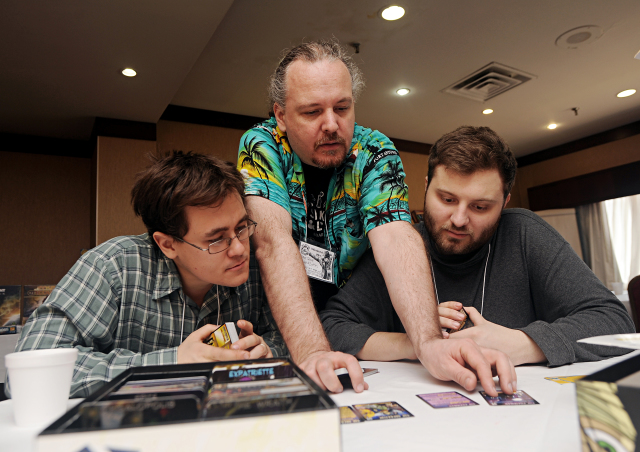Often the make or break of a good gaming experience comes down to the teach. It’s a lot of pressure to be the one responsible for getting all the rules right. A good teacher won’t just make sure they say all the rules, but stop and check for comprehension. And then there’s the issue of strategy. How much strategic advice do you give to someone versus letting them develop their own path?
I come from a family of teachers. All of my immediate family work or worked primarily as teachers in their career. I guess it’s somewhat in my blood to be a board game teacher. If you’re reading this blog then you’re probably interested enough in games that you’ve found yourself in the position to teach a game from time to time. This is a pretty important role, especially if you’re teaching people new to the hobby. Their experience with a new game can affect wether they come back again. You don’t have to make sure they win, but giving them enough information for them to visualize the objectives and make informed decisions is key. Here are a few tips that have worked for me in the past.
Know Your Audience
There’s no point trying to teach Die Macher to newbs. They won’t get it and they won’t enjoy the experience. Gauge what your players are interested in and capable of having a good experience with. They don’t have to be experts by the end of the game, but remember the little endorphin rush you got when your favourite game ‘just clicked’ for you? Yeah, that’s what you’re going for.
Start Broad
Explain the game in very general terms. ‘You own a mine and you’re trying to use your workers to get the most gold out of the mine over six rounds.’ Giving a general overview sets the scene for the players. They can visualize what they’re trying to do and all those rules that about to be explained to them will have a bit of context.
Eyes on the Prize
What is the goal in the game? How are they going to get points? How are they going to win? This can be self evident in the rules themselves, but don’t take that point for granted. I’ve often gotten to the end of a teach and been asked ‘So, how do you score points?’ Hitting the players over the head with the exact process of both scoring points and winning the game can go a long way for their overall understanding. You might even consider telling them what an typical winning score is, so they have a sense what to shoot for.

Layer the Information
Rules are usually designed to flow together and stack, so that one naturally leads to another. Take advantage of that fact and slowly parse out the parameters of the game. Ask questions and make sure that rules are understood before moving on. You’re building a foundation of knowledge and it has to be sound. Otherwise you’ll find yourself halfway through a game with people complaining they would’ve played entirely differently if they had just understood that one rule.
Use the Rulebook
There’s nothing worse than learning a game from the rulebook. Even when they’re written well they can’t compare with an actual person who has played the game. However it can be tough to remember the letter of the law on thousands of different rules. Having the rulebook on hand to check in the case of questions or disputes is very helpful. In games where every different card has a different function it can be impossible (and overwhelming) to go through them all individually. Using the reference guide will save time and confusion.
Don’t Crush Them
Once you’re actually off and playing it doesn’t mean that your role as the teacher is done. If someone is going to make a boneheaded move that will almost certainly cost them the game, it’s up to you to at least point out other options. That doesn’t mean that you can’t play to win or that you have to throw the game, but you have the advantage of experience. If you teach games to then proceed and slaughter your opponents, you’ll very quickly find yourself playing the solo variant of a lot of your favourites.
This is not an exhaustive teaching guide. It’s just a few hints that I’ve learned over the years. The important thing is to have your own delivery and to remember that gaming is supposed to be fun above all else. Find the right game for the group you’re teaching and then arm them with the skills to have a great time playing it!
[…] adaptado do post “The Teach” , de Sean J. (The Daily Worker Placement, […]